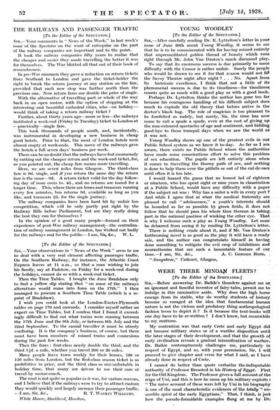THE RAILWAYS AND PASSENGER TRAFFIC
[To the Editor of the Serer/lava.] Sin,—Your comments in " News of the Week," in last week's issue of the Spectator on the want of enterprise on the part of the railway companies are important and to the point.
It took the railway companies fifty years to realize that the cheaper and easier they made travelling the better it was for themselves. The War blotted all that out of their book of remembrance.
In pre-War summers they gave a reduction on return tickets from Scotland to London and gave the ticket-holder the right to break the return journey at any station on the line, provided that each new stop was further north than the previous one. Now return fares are double the price of single.
With the alternative of travelling part or whole of the way back in an open motor, with the option of stopping at the interesting and beautiful cathedral cities, who—on holiday— would think of taking a return railway ticket ?
Further, about thirty years ago—more or less—the railways instituted a week-end (Friday to Tuesday) ticket to London at —practically—single fare.
This took thousands of people south, and, incidentally, was instrumental in developing a new business in cheap good hotels. Prior to that, the most of London hotels were almost empty at week-ends. This move of the railways gave the hotels a full seven days' business per week.
There can be no doubt that the railways have lost enormously by cutting out the cheaper return and the week-end ticket, for, as you pointed out, the cheap fare means more travelling.
Here, we arc seven miles from Glasgow. The third-class fare is 9d. single, and if you return the same day the return fare is the same-9d. A return ticket valid for the day follow- ing day of issue costs ls. 4d., and no returns are issued for a longer time. This, where there are buses and tramcars running every few minutes, bus returns 9d. available as long as you like, and tramcars 2d. for the single journey.
The railway companies have been hard hit by unfair bus competition, which will be only partly put right by the Railway Bills before Parliament, but are they really doing the best they can for themselves ?
In the opinion of a good many people—formed on their experience of post-War railway management—the centraliza- tion of railway management in London, has ;corked out badly for the railways and for the public.—I am, Sir, &c., W. L.




































 Previous page
Previous page